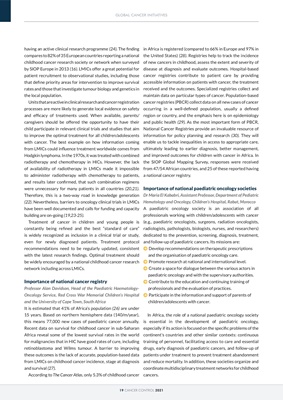
GLOBAL CANCER INITIATIVES
19 CANCER CONTROL 2021
in Africa is registered (compared to 66% in Europe and 97% in
the United States) (28). Registries help to track the incidence
of new cancers in childhood, assess the extent and severity of
disease at diagnosis and evaluate outcomes. Hospital-based
cancer registries contribute to patient care by providing
accessible information on patients with cancer, the treatment
received and the outcomes. Specialized registries collect and
maintain data on particular types of cancer. Population-based
cancer registries (PBCR) collect data on all new cases of cancer
occurring in a well-defined population, usually a defined
region or country, and the emphasis here is on epidemiology
and public health (29). As the most important form of PBCR,
National Cancer Registries provide an invaluable resource of
information for policy planning and research (30). They will
enable us to tackle inequalities in access to appropriate care,
ultimately leading to earlier diagnosis, better management,
and improved outcomes for children with cancer in Africa. In
the SIOP Global Mapping Survey, responses were received
from 47/54 African countries, and 25 of these reported having
a national cancer registry.
Importance of national paediatric oncology societies
Dr Maria El Kababri, Assistant Professor, Department of Pediatric
Hematology and Oncology, Children's Hospital, Rabat, Morocco
A paediatric oncology society is an association of all
professionals working with children/adolescents with cancer
(e.g., paediatric oncologists, surgeons, radiation oncologists,
radiologists, pathologists, biologists, nurses, and researchers)
dedicated to the prevention, screening, diagnosis, treatment,
and follow-up of paediatric cancers. Its missions are:
J Develop recommendations on therapeutic prescriptions
and the organisation of paediatric oncology care.
J Promote research at national and international level.
J Create a space for dialogue between the various actors in
paediatric oncology and with the supervisory authorities.
J Contribute to the education and continuing training of
professionals and the evaluation of practices.
J Participate in the information and support of parents of
children/adolescents with cancer.
In Africa, the role of a national paediatric oncology society
is essential in the development of paediatric oncology,
especially if its action is focused on the specific problems of the
continent's countries and other similar contexts: continuous
training of personnel, facilitating access to care and essential
drugs, early diagnosis of paediatric cancers, and follow-up of
patients under treatment to prevent treatment abandonment
and reduce mortality. In addition, these societies organize and
coordinate multidisciplinary treatment networks for childhood
cancers.
having an active clinical research programme (24). The finding
compares to 82% of 35 European countries reporting a national
childhood cancer research society or network when surveyed
by SIOP Europe in 2013 (16). LMICs offer a great potential for
patient recruitment to observational studies, including those
that define priority areas for intervention to improve survival
rates and those that investigate tumour biology and genetics in
the local population.
Units that are active in clinical research and cancer registration
processes are more likely to generate local evidence on safety
and efficacy of treatments used. When available, parents/
caregivers should be offered the opportunity to have their
child participate in relevant clinical trials and studies that aim
to improve the optimal treatment for all children/adolescents
with cancer. The best example on how information coming
from LMICs could influence treatment worldwide comes from
Hodgkin lymphoma. In the 1970s, it was treated with combined
radiotherapy and chemotherapy in HICs. However, the lack
of availability of radiotherapy in LMICs made it impossible
to administer radiotherapy with chemotherapy to patients,
and results later confirmed, that such combination regimens
were unnecessary for many patients in all countries (20,21).
Therefore, this is a two-way road in knowledge generation
(22). Nevertheless, barriers to oncology clinical trials in LMICs
have been well documented and calls for funding and capacity
building are on-going (19,23-25).
Treatment of cancer in children and young people is
constantly being refined and the best "standard of care"
is widely recognized as inclusion in a clinical trial or study,
even for newly diagnosed patients. Treatment protocol
recommendations need to be regularly updated, consistent
with the latest research findings. Optimal treatment should
be widely encouraged by a national childhood cancer research
network including across LMICs.
Importance of national cancer registry
Professor Alan Davidson, Head of the Paediatric HaematologyOncology Service, Red
Cross War Memorial Children's Hospital
and the University of Cape Town, South Africa
It is estimated that 41% of Africa's population (26) are under
15 years. Based on northern hemisphere data (140/m/year),
this means 77,000 new cases of paediatric cancer annually.
Recent data on survival for childhood cancer in sub-Saharan
Africa reveal some of the lowest survival rates in the world
for malignancies that in HIC have good rates of cure, including
retinoblastoma and Wilms tumour. A barrier to improving
these outcomes is the lack of accurate, population-based data
from LMICs on childhood cancer incidence, stage at diagnosis
and survival (27).
According to The Cancer Atlas, only 5.3% of childhood cancer